Life Extension Magazine®
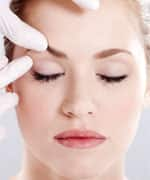
The delicate features around the eye are among the attributes focused on to estimate a person’s age.1 This finding has encouraged maturing individuals to seek skin care specifically designed for this prominent area of the face.
This article will detail how topically applied compounds effectively target the natural recycling process of skin cells to promote skin renewal and rejuvenation to the area around the eye.
When tested in a clinical study with 80 female volunteers aged 31 to 50, this unique combination reduced wrinkle depth in the optical facial area by an average of 17% in just 28 days. This translates into a remarkable skin rejuvenation effect of 6 years in just 4 weeks! 2
Aging Changes in the Eye Area
The skin around the eyes is naturally thin and is constantly exposed to oxidative stress from environmental stressors such as sunlight, smoking, and air pollution.3 This constant assault gradually breaks down the fibrous network composed of proteins, elastin, and collagen, resulting in thinner skin in the eye region as you age. Facial expressions like laughing and frowning further contribute to the destruction of the skin proteins and stimulate the formation of wrinkles (crow’s feet), dark circles, and bags under the eyes.4
Let’s first take a look at one of the primary underlying causes of skin aging: loss of function of the proteasome.
Proteasomal Dysfunction Contributes to Skin Aging
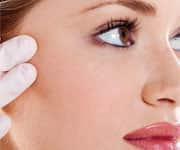
Skin cells are continuously synthesizing proteins to maintain their structural integrity and proper functioning. Some of these proteins are damaged by free radicals during normal metabolism and as a result are tagged for destruction by the molecule ubiquitin.5 The marked proteins are subsequently directed to a multi-protein structure known as the proteasome, which contains enzymes that degrade and recycle the unwanted proteins.5 This tightly regulated balance between the formation of new proteins and the disposal of damaged ones is vital for healthy, youthful-looking skin.
As you age, the function of the proteasome declines, and the removal of damaged proteins slows.6 This leads to a toxic accumulation of unnecessary proteins within skin cells that eventually clump together to form protein aggregates, which disrupt normal cellular functions and further impair the activity of the proteasome.7 Over time, this process results in the outward signs of aging, such as age spots and wrinkles.
Fortunately, scientific evidence indicates that several nutrients can combat the occurrence of damaged proteins and directly activate the proteasome, along with restoring moisture to inhibit cellular skin aging.
Jujube Seed Extract Boosts Antioxidant Defense
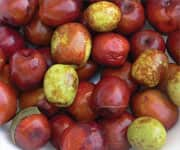
In traditional Chinese medicine, the jujube fruit (Ziziphus jujube Mill) has been recommended as a treatment for a variety of health conditions. 8 These beneficial effects are believed to be due to its impressive array of antioxidant compounds, including flavonoids, phenolics, and vitamin C.8 The antioxidant potency of jujube seed extract provides an excellent tool for guarding the skin against free radical damage, particularly in the sensitive area around the eyes.
Although free radicals are a normal product of cellular metabolism, excessive production of these molecules can overwhelm the antioxidant system in place to counteract them and leave vital skin proteins in the cell vulnerable to attack.9 Jujube seed extract strengthens the antioxidant protection system and inhibits the occurrence of damaged proteins by neutralizing free radicals.2
Another skin benefit of jujube seed extract can be attributed to its tonic properties, which helps revitalize the skin and ensure a more vibrant, healthier look.2
Olive Leaf Extract Activates the Proteasome
As the mainstay of the Mediterranean diet, the olive fruit contains compounds that are responsible for its well-known antioxidant and anti-inflammatory effects. One of these compounds, oleuropein, is found in high concentration in the olive’s leaf and appears to have anti-aging potential. 10
In an in-vitro study, researchers examined the impact of olive leaf extract with oleuropein on proteasome activity in human keratinocytes—the most common type of skin cell in the upper layer of the skin (epidermis). After exposing keratinocytes to olive leaf extract with oleuropein, they found a significant increase in proteasome activity. In fact, the extract doubled the activity compared to the control.2
This improved action of the proteasome causes damaged proteins to be degraded more efficiently, thereby preventing the buildup of proteins that promote cellular aging.
What You Need to Know
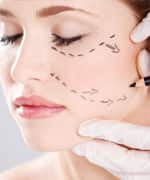 |
Topical Nutrients To Rejuvenate the Aging Skin of the Eyes
- Since it’s naturally thin, the facial area around the eyes is often the first place to show visible signs of aging, such as age spots, dark circles, and crow’s feet.
- The proteasome is a multi-protein structure within skin cells that degrades or removes damaged proteins, which helps maintain healthy, youthful-looking skin.
- As you age, proteasome activity decreases, and this leads to a toxic accumulation of damaged proteins that accelerates skin aging in the form of age spots and wrinkles.
- A novel cream has been formulated with clinically proven anti-aging ingredients to specifically target proteasome activation.
- Jujube seed extract has beneficial antioxidant compounds that strengthen the antioxidant protection system and reduce the occurrence of damaged proteins induced by free radicals.
- Olive leaf extract directly activates the proteasome, improving its activity and ability to efficiently degrade damaged proteins.
- Levan has potent moisturizing effects, which hydrates and tightens the skin.
- In a controlled clinical study, these ingredients reduced wrinkle depth in the eye area by an average of 17% in just 28 days, a remarkable skin rejuvenation effect of 6 years.
Levan Exerts Powerful Moisturizing Effects
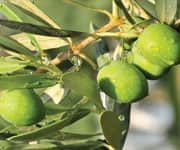
Moisture loss promotes dry, flaking, and sagging skin. It can cause fine lines and wrinkles to be more visible. This is especially apparent in the skin around the eyes, since it naturally has very few sebaceous glands and produces less oil as you age.11 Levan is a polymer that has been utilized for a number of applications (including cosmetics) and by the pharmaceutical industry.12 It has shown promise as an effective topical ingredient in cosmetics due to its ability to attract water molecules into the skin, thereby helping restore lost moisture by improving hydration and tightening of the skin.2,11,12
Rejuvenates the Eye Area in Humans

Scientists evaluated the efficacy of these ingredients on wrinkle depth in 80 women between the ages of 31 and 50. In this controlled clinical study, participants applied the nutrient-dense combination twice daily to the eye area for 28 days. Wrinkle depth was measured at day 14 and 28. At the end of the study, the findings revealed that wrinkle depth was reduced by an average of 17% in just 4 weeks.2
The results became even more impressive when scientists calculated the rejuvenation effect of the decrease in wrinkle depth in subjects with the average age of 44. The subjects exhibited the wrinkle depth expected in an individual with the average age of 38, a remarkable anti-aging effect of 6 years. 2
Summary
The facial area around the eyes is the first place to show visible signs of premature aging such as age spots and wrinkles. A topical eye cream has been designed specifically for targeting this delicate area of tissue.
The three ingredients, jujube extract, olive leaf extract, and levan, have scientific data supporting their ability to enhance the antioxidant protection system and activate the proteasome, along with properly hydrating the skin, all of which slows down cellular skin aging. In a controlled clinical study, a formulation of these ingredients was shown to reduce wrinkle depth by an average of 17%, translating to a skin rejuvenation of the eye area by 6 years.2
If you have any questions on the scientific content of this article, please call a Life Extension® Health Advisor at 1-866-864-3027.
Editor's Note
Science continues to evolve, and new research is published daily. As such, we have a more recent article on this topic: Revitalize Skin Around the Eyes
References
- Nkengne A, Bertin C, Stamatas GN. Influence of facial skin attributes on the perceived age of Caucasian women. J Eur Acad Dermatol Venereol. 2008 Aug;22(8):982-91.
- Available at: http://www.kinetiktech.com/brochures/pdf/rahn/proteolea-leaflet.pdf. Accessed September 15, 2012.
- Poljšak B, Dahmane R. Free radicals and extrinsic skin aging. Dermatol Res Pract. 2012;2012:135206.
- Available at: http://www.mayoclinic.com/health/wrinkles/ds00890/dsection=causes. Accessed March 27, 2013.
- Bregegere F, Milner Y, Friguet B. The ubiquitin-proteasome system at the crossroads of stress-response and ageing pathways: a handle for skin care? Ageing Res Rev. 2006 Feb;5(1):60-90.
- Hwang JS, Hwang JS, Chang I, Kim S. Age-associated decrease in proteasome content activities in human dermal fibroblasts: restoration of normal levels of proteasome subunits reduces aging markers in fibriblasts from elderly persons. J Gerontol A Biol Sci Med Sci. 2007 May;62(5):490-9.
- Nunziante M, Ackermann K, Dietrich K, et al. Proteasomal dysfunction and endoplasmic reticulum stress enhance trafficking of prion protein aggregates through the secretory pathway and increase accumulation of pathologic prion protein. J Biol Chem. 2011 Sept; 286(39):33942-53.
- Gao QH, Wu CS, Wang M. The Jujube (Ziziphus jujuba Mill.) Fruit: A Review of Current Knowledge of Fruit Composition and Health Benefits. J Agric Food Chem. 2013 Mar 12. [Epub ahead of print]
- Chevion M, Berenshtein E, Stadtman ER. Human studies related to protein oxidation: protein carbonyl content as a marker of damage. Free Radic Res. 2000 Nov;33 Suppl:S99-108.
- Omar SH. Oleuropein in olive and its pharmacological effects. Sci Pharm. 2010;78(2):133-54.
- Wali UK, Al-Mujaini A. Sebaceous gland carcinoma of the eyelid. Oman J Ophthalmol. 2010 Sep;3(3):117-21.
- Available at: http://www.realbio.com/file_download.php?nfile= 1_1266480435.pdf&ofile=Levan-Application+and+Perspectives.pdf&b_code=101. Accessed April 29, 2013.

